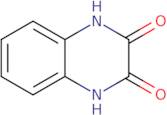Quinoxaline-2,3(1H,4H)-dione
CAS : 15804-19-0
Ref. 3D-FQ41986
| 5g | Arrêté | ||
| 10g | Arrêté | ||
| 25g | Arrêté | ||
| 50g | Arrêté | ||
| 100g | Arrêté |
Informations sur le produit
- 1,2,3,4-Tetrahydro-2,3-dioxoquinoxaline
- 1,4-Dihydro-2,3-quinoxalinedione
- 1,4-Dihydroquinoxaline-2,3-Dione
- 2,3(1H,4H)-Quinoxalinedione
- 2,3-Quinoxalinediol
- 2,3-Quinoxalinedione, 1,4-dihydro-
- 3-Hydroxy-1,2-dihydroquinoxalin-2-one
- NSC 8698
- NSC 9431
- Quinoxaline-2,3-Diol
- Voir d'autres synonymes
- 2,3-Dihydroxyquinoxaline
Quinoxaline-2,3(1H,4H)-dione is a potent and selective inhibitor of aldehyde oxidase, an enzyme that catalyzes the oxidation of aldehydes. This inhibitor has been shown to protect neuronal function in rat models. Quinoxaline-2,3(1H,4H)-dione has also been shown to have antimicrobial activity against Gram-positive bacteria by inducing Ca2+ overload and inhibiting protein synthesis. In addition, this compound is effective against both Gram-positive and Gram-negative bacteria. The compounds are active substances in surface-enhanced Raman spectroscopy as they are capable of enhancing the Raman signal when bound to a metal surface. A diethyl ester derivative was synthesized with selenium atoms replacing the carbonyl groups on the ring structure and was found to be more efficient than its parent compound in surface-enhanced Raman spectroscopy.





